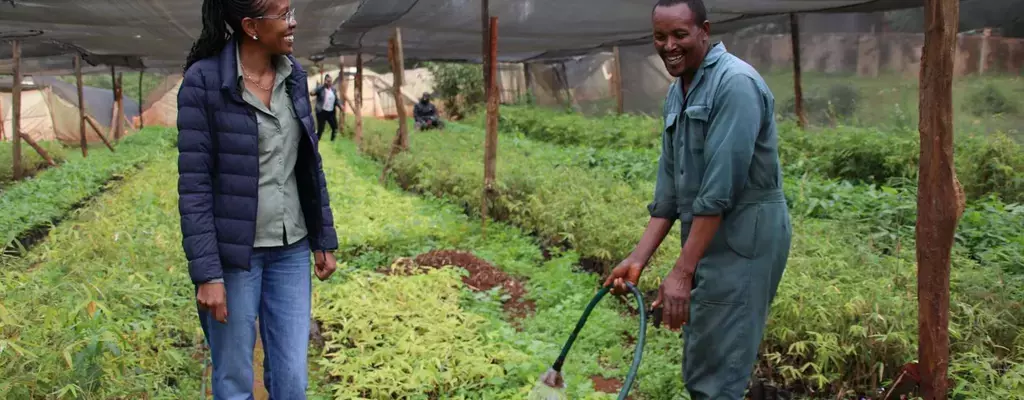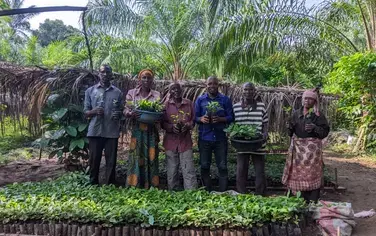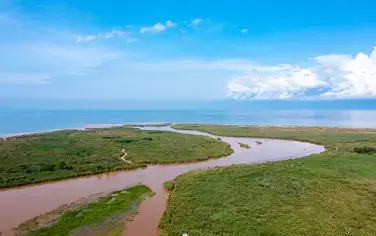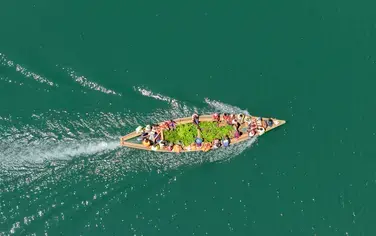By Venkat Iyer, Mary Gronkiewicz, Samuel Kabiru, Will Anderson and Amanda Gant | World Resources Institute
Here’s the good news: In the past decade, development banks and the private sector have made financial commitments of more than $16 billion to restore Africa’s degraded farms, forests and other ecosystems through the AFR100 and the Great Green Wall Initiatives. It’s no wonder funders are interested — every $1 invested in land restoration can create $7-30 in economic benefits while protecting biodiversity and fighting climate change.
Here’s the bad news: We don’t know exactly how much money has landed in the hands of locally run projects on-the-ground, but we do know it isn’t nearly enough. Instead, most of the money has gone to large international NGOs and government programs instead of the local community groups or businesses who do the hard work of land restoration.
Africa’s investment gap is an offshoot of a global problem: funding to reverse land degradation and combat desertification — Sustainable Development Goal 15.3 — falls short by over $300 billion a year.
Across the 34 member countries of AFR100 and the Great Green Wall, hundreds of locally run projects remain underfunded or entirely ignored. To put it bluntly, we are not on track to meet the continent’s ambitious goal to restore over 100 million hectares of degraded land by 2030, jeopardizing the ability of African nations to feed an estimated 2.5 billion people by 2050.
Currently, desertification affects 45% of Africa’s land, and 55% of that area is vulnerable to further degradation. If desertification continues to advance unchecked, the decline in revenue from cereal crops alone could cost $4.6 trillion from 2015 to 2030.
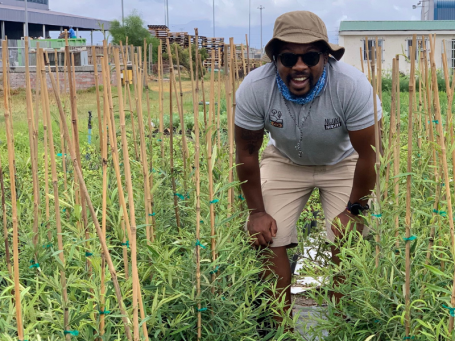
In South Africa, Siyabulela Sokomani's Nguni Nursery grows native trees for restoration projects. Investing in local restoration entrepreneurs can reverse decades of land degradation while creating jobs across Africa. Photo by Siyabulela Sokoman
Why Invest in African Entrepreneurs Who are Combatting Land Degradation?
As we begin the UN Decade on Ecosystem Restoration (2021-2030), some of the world’s most influential restoration leaders have issued a rallying cry: We must invest in entrepreneurs who are leveraging sustainable agriculture and forestry value chains to create permanent jobs and regreen their ecosystems.
These locally led business models present a promising path to reverse decades of land degradation while creating jobs for the world’s youngest continent. Most of them don’t view restoration as charity, but as a way to bring their communities out of poverty while fighting climate change and restoring lost biodiversity and ecosystem services.
Some entrepreneurs are ready for — and others have received — investment, but many more need support to build up their business skills and capacity to absorb funding. A small company won’t be ready to receive a million-dollar investment. To this end, programs like WRI’s Land Accelerator Africa and the WEF’s UpLink Challenge are equipping budding entrepreneurs with the training and mentorship they need to collectively turn the tide against land degradation.
With over 2,000 Land Accelerator Africa applicants since 2018, one thing is certain: these innovators can create huge change with access to predictable and affordable funding.
For example, when land restoration companies thrive, they provide new sources of income for the farmers whose crops they buy and process; this presents an alternative to deforestation-linked agricultural expansion. They can also improve food security by cutting food loss and waste; repair soils damaged by chemical fertilizers; and build up resilience to climate-induced floods, droughts and landslides by growing the right trees on farms and terraced hills.
The smaller scale of these nascent businesses — the companies in the 2018 and 2019 Land Accelerator cohorts had an average revenue of $288,000 — gives them a surprising advantage. Their close connection to the areas where they work enables them to tailor their restoration strategies to the ecology of the landscape and the environmental, social and economic goals of the people living there.
This is good news for investors, too, particularly those who are embracing Environmental, Social, and Governance (ESG) standards. Working with locally led businesses can ensure their investments will support activities that maximize ecological benefits, comply with local laws and regulations, and assist marginalized groups like women and young people, while still turning a profit.
Take, for example, Sadik ibn Abdulai. After seeing his homeland in northern Ghana slowly succumb to the encroaching Sahara Desert, ibn Abdulai turned to a small but mighty ally: bees. He founded Tilaa, a company that works with farmers to produce cashews, animal feed, honey and other bee products.
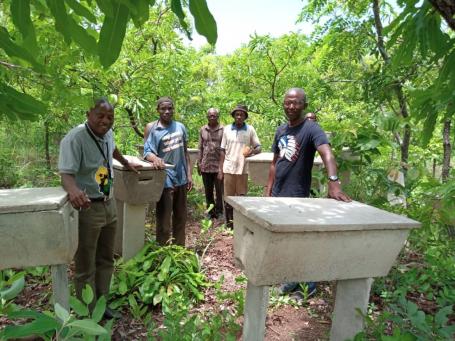
Sadik ibn Abdulai works with communities in Northern Ghana to grow cashews and keep bees under the canopy. Photo by Sadik ibn Abdulai
By adding beehives and cashew trees onto croplands, ibn Abdulai and his team are helping a network of over 500 women farmers adopt climate-friendly land use practices and fortify their land against desertification. Cashew trees are known for their ability to grow in dry, sandy soil and can withstand drought and high temperatures, making them ideal for the climate of northern Ghana. Bees pollinate the cashew trees and other crops in the surrounding area, increasing yields. In turn, the trees produce fruit, improve the quality of the soil and curb erosion through their extensive root systems.
Most importantly, women are now growing trees that generate income: They sell their cashews, honey and other bee products back to Tilaa for processing, packaging and sale in domestic and international markets.
Since its founding in 2015, Tilaa has distributed over 120,000 cashew saplings to restore 300 hectares of degraded land. The women in the company’s network report that their disposable incomes have quadrupled from $500 to $2,000, and they no longer need to turn to unsustainable practices, like illegal tree cutting, to make ends meet. The company also automatically registers its farmers to Ghana’s National Health Insurance Scheme and is creating a revolving loan fund to support them in other economic ventures.
Closing the Funding Gap for Land Restoration Entrepreneurs
If ibn Abdulai had more funding, he could easily scale up his operation to purchase new machines to increase processing efficiency, hire 500 more women and restore an additional 300 hectares of land. There are thousands of entrepreneurs like him across Africa with fresh ideas that could be converted into profitable businesses with little upfront investment.
Yet, many investors balk at the prospect of investing in small businesses. Instead, they follow a style of impact investing that largely mirrors a traditional venture capital model, preferring to fund large, fast-growing business models that seek millions of dollars in investment.
These enterprises often work in established value chains, like coffee or cacao, or are technology start-ups promising quick solutions to the climate crisis. Such organizations are better equipped to absorb large amounts of funding – like the $28 million investment in Kenyan wood products start-up Komaza — but these opportunities are rare and may not be in tune with the needs and goals of local communities.
By contrast, WRI and its partner Fledge promote a model of impact investing that grows the profitability of small-scale companies and maximizes the amount of revenue generated for each dollar invested, according to Fledge founder Luni Libes. These investments are typically smaller — alumni of the Land Accelerator tell us that they need between $50,000 and $1 million each.
For example, companies that grow tree crops gain revenue by selling their products and with that funding acquire assets, like land and trees, that add value to their businesses and lead to even more environmental impact.
We know that this model works because the 104 businesses from 34 countries that have completed the Land Accelerator Africa have told us that they have collaborated with nearly 400,000 smallholder farmers, created 12,000 jobs and begun to restore 130,000 hectares of degraded land.
Can you imagine the impact of funding all 2,000 entrepreneurs who applied to the program?
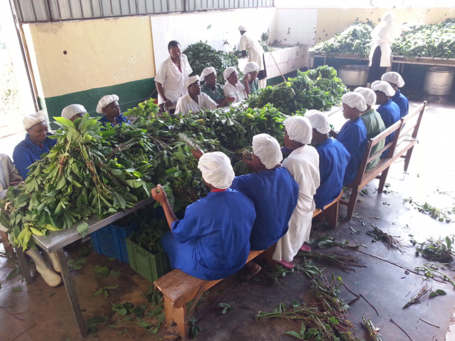
Shekina Foods helps smallholder farmers transform the leaves of cassava shrubs into sustainable food products. Empowering entrepreneurs has massive environmental benefits, but also creates jobs, improves economic diversity and strengthens food and water security. Photo by Shekina Foods
Massive Investment in Local Land Restoration Is Possible. Here’s How.
It’s time to unlock massive investment in small and medium-sized enterprises (SMEs), or businesses with less than $2 million in total assets (excluding land). In short, we need a mentorship and training system that increases their capacity to absorb influxes of finance, strengthens their business models and expands their customer base. This framework must include:
1. Robust Business Training Programs.
After participating in the Land Accelerator in 2018, ibn Abdulai leveraged his new knowledge and connections to refine his business pitch and promote his company across a variety of channels. Although Tilaa’s revenue dipped slightly in 2020 due to the COVID-19 pandemic, ibn Abdulai expects that by the end of 2021 the company’s revenue will jump to $367,000, triple that of 2019.
He’s not alone: Alumni of the Land Accelerator report that after the program, their businesses have doubled in size, on average, showing that a little training can go a long way.
And the Land Accelerator is just one of many regional incubators. Programs like the Restoration Factory are also providing critical technical training, mentorship and marketing skills to help businesses build their brand and connect with potential financiers. The next step is to expand these regional programs and build national accelerators that can craft a stronger pipeline of investable businesses.
2. Favorable Public Policies.
Businesses looking to acquire a loan face many challenges, including high interest rates, the requirement of upfront collateral to qualify for loans, and short-term repayment plans. Since trees are a long-term investment — they can take years to bear fruit — tree-based businesses require long-term loan flexibility that most lenders cannot offer. Due to these challenges, thousands of SMEs in sub-Saharan Africa don’t receive funding and face an annual financing gap of $65 billion.
Public capital can provide early finance to start-ups where private banks are unwilling to take on the risk. Government incentive programs and investment programs can be an important source of funding to cover up-front costs like nursery development and infrastructure during a company’s lean start-up years.
They can also back up companies’ private insurance plans, guaranteeing that start-ups receive payments for damage even if the policy provider goes bankrupt. Finally, governments can provide direct subsidies for products that come from restored land to shore up companies’ bottom lines.
However, many existing government support programs are plagued by clunky bureaucratic processes, slow payouts and low public awareness. To better meet the needs of entrepreneurs, women and Indigenous communities who restore land, policymakers need to adapt agriculture and forestry incentives.
In Latin America, WRI’s Restoration Policy Accelerator has partnered with five countries to analyze existing policies, diagnosis their inefficiencies and work with government officials to revamp incentives programs. By adopting this approach across Africa, countries can boost the ease of doing business and reduce investment risk.
3. Strong Intermediaries to Bundle and Disburse Funding.
The more investors that a business has, the more complicated its financial flows and reporting. Investing in thousands of restoration entrepreneurs will require strong financial intermediaries that collect a pipeline of investable entrepreneurs and then channel funding toward them. By pooling funding, these trustworthy intermediaries — large nonprofits, government agencies, microfinance institutions — cut down the time it takes investors to find worthwhile investments and the number of funding sources for entrepreneurs. A group of these intermediaries working in tandem under AFR100 could coordinate how funding is parceled out to entrepreneurs and plan for maximum long-term impact.
4. Trusted Corporate Finance at a Massive Scale.
In 2020, corporate interest in funding restoration initiatives skyrocketed with the launch of the Trillion Trees and the Priceless Planet Coalition corporate planting alliances. Still, multinational companies find it difficult to connect with small-scale restoration projects they trust and that can grow the millions of trees needed to contribute to their climate goals. To mitigate the risk of failed projects and accusations of greenwashing, they look for organizations with a proven record of success.
The problem is that there aren’t many large projects (10,000+ hectares), and the existing pool of those large projects is dominated by external NGOs who lack local knowledge. This creates an unrealistic funding climate for sustainable businesses in rural areas.
In response, matchmaking platforms like TerraMatch, carbon certification organizations like Verra and even the popular search engine Ecosia are connecting companies with credible, vetted projects run by local entrepreneurs that deliver the carbon, environmental and social benefits corporations desire.
With more than 20% of the world’s 2,000 largest companies already committed to reaching net-zero CO2 emissions by 2050 — and as corporations decarbonize their operations and supply chains — demand for restoration projects that sequester carbon will only grow. In preparation, WRI and partners are raising capital for a multi-million-dollar fund that will provide affordable loans to African entrepreneurs that can prepare them to absorb even larger investments in years to come.
5. Accessible, Accurate Monitoring Systems.
To maintain investor confidence, entrepreneurs need centralized and accessible monitoring systems that can help them efficiently report their progress, even in remote areas. Project-level monitoring tools available on platforms like TerraMatch and the Regreening Africa App use a combination of satellite imagery, site photos and other self-reported data to increase transparency for investors, enabling them to verify the impact of their portfolio more easily.
Project developers should also use these tools to showcase their successes, improving their chances of securing additional funding. As for investors, they must communicate the accomplishments of their partners and encourage their peers to invest in similar ventures.
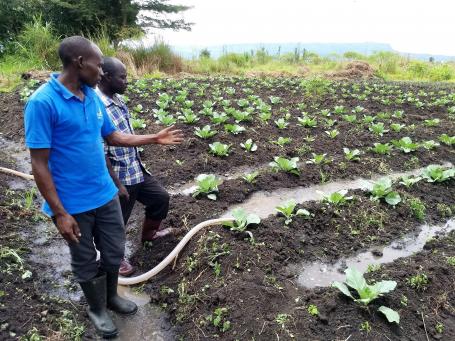
Agriworks Uganda is a Land Accelerator graduate that provides affordable irrigation to smallholder farmers. Alumni of the Land Accelerator report that after the program, their businesses have doubled in size, on average. A little training can go a long way. Photo by Agriworks Uganda
A Glimpse of the Future
Empowering entrepreneurs like Sadik ibn Abdulai not only has environmental benefits, but also creates jobs, improves economic diversity and strengthens food and water security. These contributions are more important than ever as the world continues to grapple with the disastrous effects of the coronavirus pandemic.
If we are to achieve the goals of AFR100 and Great Green Wall, and pursue similar goals in other regions, we need to take equally bold action. Ibn Abdulai and his counterparts are leading by example.
With the right support, thousands of other entrepreneurs are ready to continue their own journeys and grow a vital, prosperous continent.
Keep up to date with the latest information about the Land Accelerator by subscribing to our mailing list.
Are you an investor and looking to learn more? Reach out to our team.
